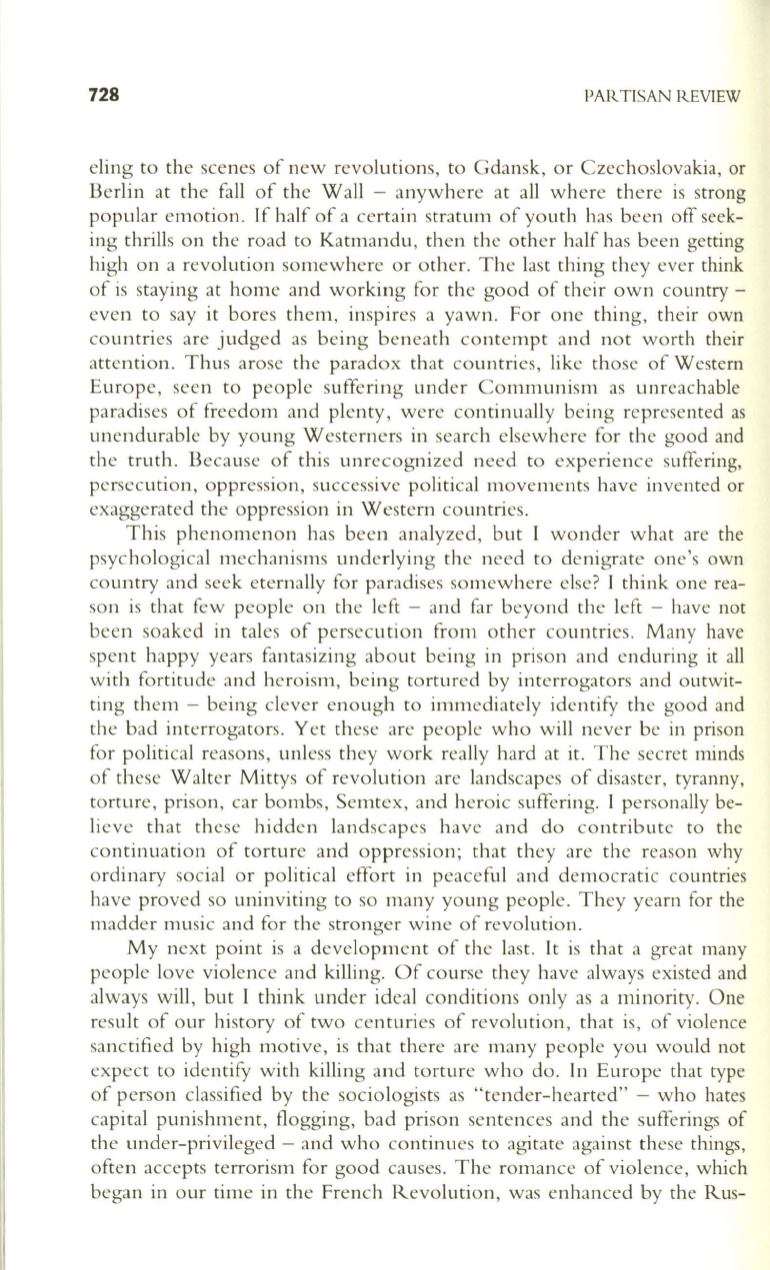
728
PAR.TISAN REVIEW
eling to the scenes of new revolutions, to Gdansk, or Czechoslovakia, or
Berlin at the fall of the Wall - anywhere at all where there is strong
popular emotion. If half of a certain stratum of youth has been off seek–
ing thrills on the road to Katmandu, then the other half has been getting
high on a revolution somewhere or other. The last thing they ever think
of is staying at home and working for the good of their own country -
even to say it bores them, inspires a yawn. For one thing, their own
countries are judged as being beneath contempt and not worth their
attention. Thus arose the paradox that countries, like those of Western
Europe, seen to people suffering under Communism as unreachable
paradises of freedom and plenty, were continually being represented as
unendurable by young Westerners in search elsewhere for the good and
the truth. Because of this unrecognized need to experience suffering,
persecution, oppression, successive political movements have invented or
exaggerated the oppression in Western countries.
This phenomenon has been analyzed, but I wonder what are the
psychological mechanisms underlying the need to denigrate one's own
country and seek eternally for paradises somewhere else? I think one rea–
son is that few people on the left - and far beyond the left - have not
been soaked in tales of persecution from other countries. Many have
spent happy years fantasizing about being in prison and enduring it all
with fortitude and heroism, being tortured by interrogators and outwit–
ting them - being clever enough to immediately identify the good and
the bad interrogators. Yet these are people who will never be in prison
for political reasons, unless they work really hard at it. The secret minds
of these Walter Mittys of revolution are landscapes of disaster, tyranny,
torture, prison, car bombs, Semtex, and heroic suffering. I personally be–
lieve that these hidden landscapes have and do contribute to the
continuation of torture and oppression; that they are the reason why
ordinary social or political effort in peaceful and democratic countries
have proved so uninviting to so many young people. They yearn for the
madder music and for the stronger wine of revolution.
My next point is a development of the last. It is that a great many
people love violence and killing. Of course they have always existed and
always will, but I think under ideal conditions only as a minority. One
result of our history of two centuries of revolution, that is, of violence
sanctified by high motive, is that there are many people you would not
expect to identifY with killing and torture who do. In Europe that type
of person classified by the sociologists as "tender-hearted" - who hates
capital punishment, £logging, bad prison sentences and the sufferings of
the under-privileged - and who continues to agitate against these things,
often accepts terrorism for good causes. The romance of violence, which
began in our time in the French Revolution, was enhanced by the Rus-


